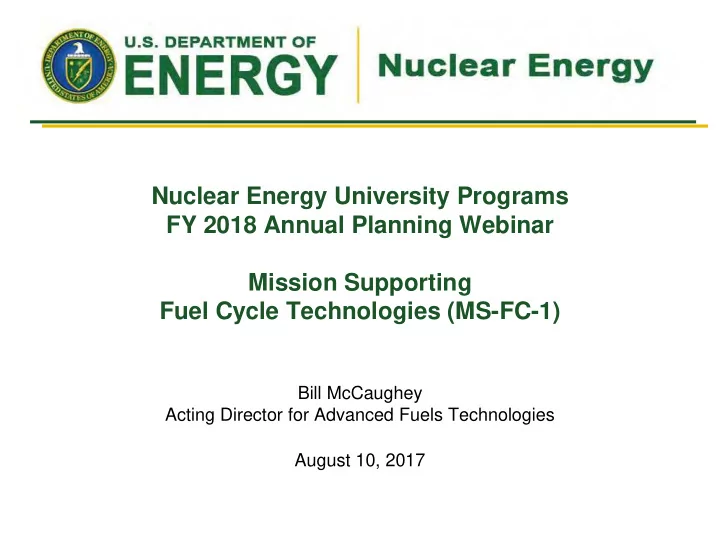

Nuclear Energy University Programs FY 2018 Annual Planning Webinar Mission Supporting Fuel Cycle Technologies (MS-FC-1) Bill McCaughey Acting Director for Advanced Fuels Technologies August 10, 2017
MS-FC-1 Workscope The Fuel Cycle Research & Development program conducts generic (not site specific) research and development related to spent nuclear fuel, nuclear waste management and disposal issues. The program also conducts R&D on advanced fuel cycle technologies that have the potential to improve resource utilization and energy generation, reduce waste generation, enhance safety, and limit proliferation risk. Applications are sought for advanced fuel treatment or material recovery processes, innovative fuel designs, and innovative fuel cycle analysis tools. Areas of interest include "blue sky" concepts for advanced methods of managing used nuclear fuel, such as innovative recycling, transport, storage, and disposal concepts. Areas of interest for fuel R&D include, but are not limited to, advanced concepts for existing LWR and other thermal spectrum reactors and advanced transmutation fuels for fast or mixed spectrum systems. Advanced fuel concepts may also include LWR fuel with improved performance benefits and fast reactor fuel with improved cladding performance (e.g., ability to withstand 400 dpa). This call excludes nuclear reactor technologies. Applications for mission supporting nuclear reactor technologies should respond to the call in “Mission Supporting: Nuclear Reactor Technologies” elsewhere in this solicitation. 2 Talk Topic
Material Recovery and Waste Form Development Conduct broad research and development activities related to the back end of the nuclear fuel cycle. • Improve resource utilization and energy generation • Reduce waste generation • Enhance safety • Limit proliferation Research on molten salt chemistry to support advanced reactor technologies based on the use of molten salts as fuel and/or coolants. Research on advanced and innovative analytical technologies, characterization technologies and on-line monitoring tools. 3 FCT 2012 Annual Review Meeting
Advanced Fuels Advanced reactor fuels with Advanced LWR fuels with enhanced proliferation enhanced performance, safety, resistance and resource and reduced waste generation utilization Multi-scale, multi-physics fuel performance modeling & simulation Capability Development for Science-Based Approach to Fuel Development - Advanced characterization and PIE techniques - Advanced in-pile instrumentation - Separate effects testing - Transient testing infrastructure 4
Material Protection, Accounting & Control Technologies Develop the technologies and analysis tools to support the next generation of nuclear materials management and safeguards for planned and emerging U.S. nuclear fuel cycles. Challenges: • Limitations of accuracy and timeliness of detection (especially in high radiation fields) • Aggregating and integrating process data from large information streams • Assessment of new reactor designs and fuel concepts which require new nuclear material management approaches 5
Systems Analysis & Integration Provides the critical capability needed to analyze complex nuclear energy system options, assess overall performance, and improve understanding of the interdependencies between various subsystems and associated technologies. Expand the capability to analyze a complete nuclear energy system from resource acquisition to waste disposal. Support the development of promising fuel cycle options under development by industry. 6
Used Fuel Disposition R&D Storage & Transportation Disposal Provide a sound technical basis Support the development of the technical bases: for multiple viable disposal options in the US. To demonstrate used fuel Increase confidence in the integrity for extended storage robustness of generic disposal periods concepts. For fuel retrievability and Develop the science and transportation after long term engineering tools needed to storage support disposal concept For transportation of high implementation. burnup fuel 7
Recommend
More recommend